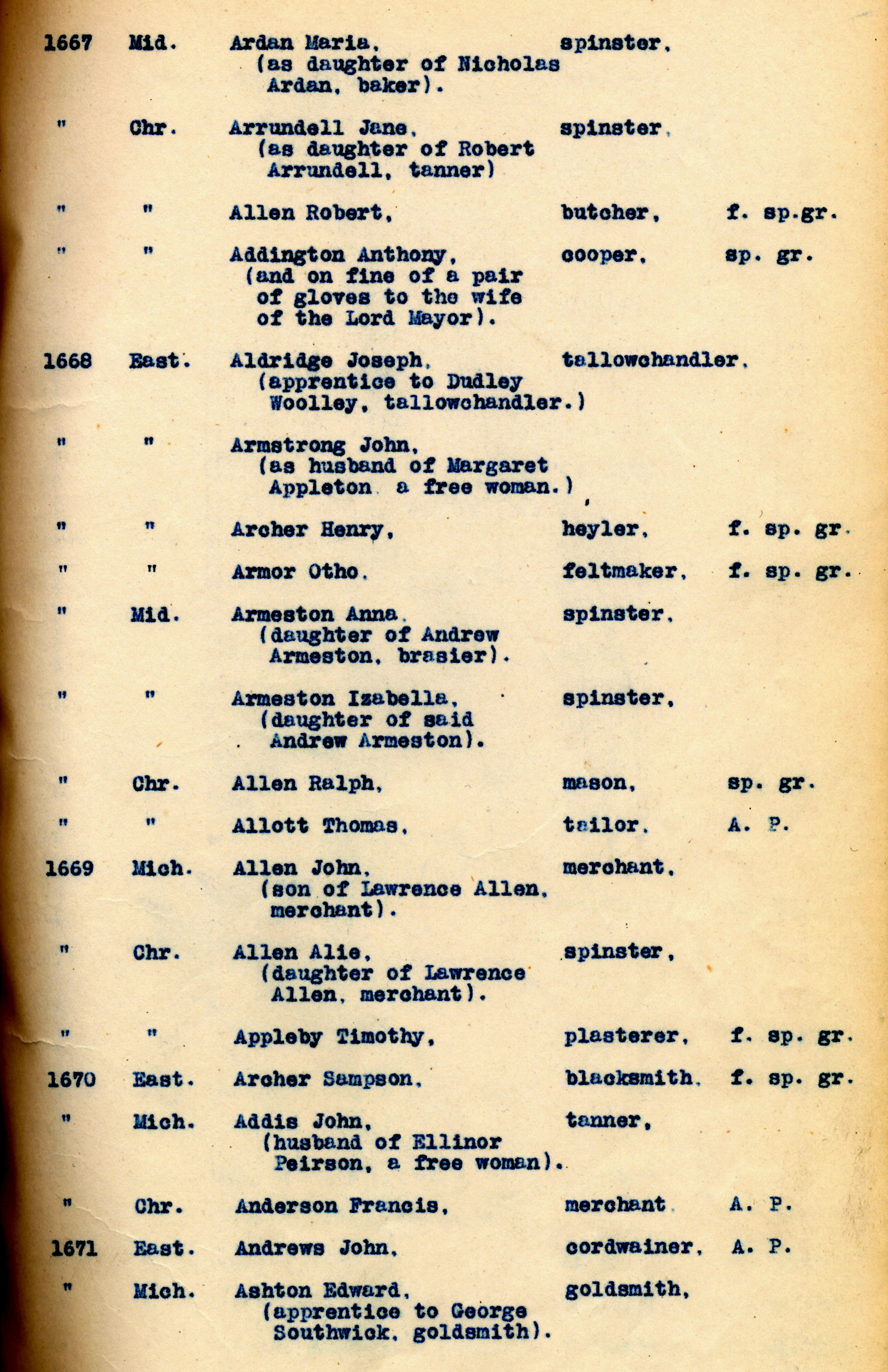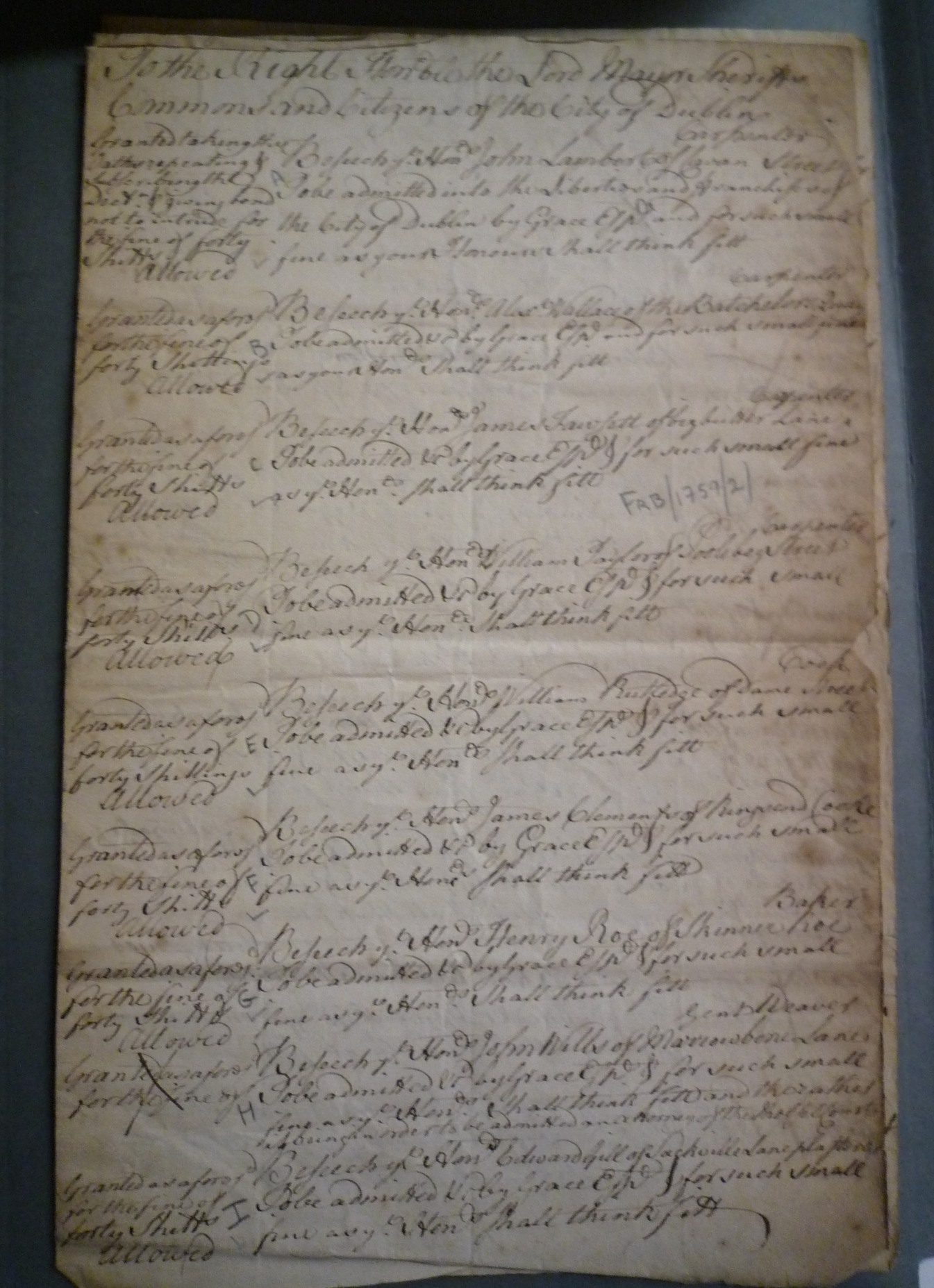Dublin Freemen, 1461 to 1491, 1564 to 1774


ABOUT THE PROJECT
This on-line listing of early Dublin freemen is a Dublin City Council project, under the overall direction of [former] Dublin City Librarian, Margaret Hayes, with inputs from [former] Dublin City Archivist, Dr. Mary Clark, and [former] Divisional Librarians Dr. Maire Kennedy and Alastair Smeaton.
It was researched and edited by John Grenham for publication by Dublin City Library & Archive in 2011.
If you have a query, or can provide additional information, please contact us.
- What are these records?
- What was the freedom of Dublin?
- How did someone become a freeman?
- What can these records tell me?
- What original records are these lists based on?
- What about later years?
- What are these records?
- These records are a list of all those admitted to the freedom of Dublin city from 1461 to 1491, and 1564 to 1774. The admissions took place at the four city assemblies of Christmas, Easter, Midsummer and Michaelmas. There are 23,257 records from the Thrift Index and 1,914 records from 'beseeches' in total.
- What was the freedom of Dublin?
- “Freedom” was, in effect, citizenship: freemen had the right to vote, were exempt from many tolls and taxes, were subject to the laws of Dublin and had the duty to take up arms to defend the city when it was under attack.
- How did someone become a freeman?
- By far the most common method was by admission to one of the Dublin trade guilds. Full admission to a guild was conditional on becoming a freeman. Almost half of the records show this kind of admission, by service, “s”. In addition, one could become a freeman by:
- 1. Birth – “b.” – sons (and sometimes daughters) of freemen were eligible;
- 2. Marriage – “m.” – sons-in-law of freemen were eligible;
- 3. Fine – “f.” or "ff" – payment of a hefty fee could secure admission;
- 4. Grace Especial – “sp. gr.” or “G.E.” or “Gr.” – the assembly could confer freedom as an honour;
- 5. Act of Parliament – “A.P.” – to assist Protestant immigration, especially of Huguenots.
- By far the most common method was by admission to one of the Dublin trade guilds. Full admission to a guild was conditional on becoming a freeman. Almost half of the records show this kind of admission, by service, “s”. In addition, one could become a freeman by:
- What can these records tell me?
- The simple search returns all those with the same surname or any variants.
- The occupation search can be used to reconstruct admissions to the guilds.
- What original records are these lists based on?
These lists are based on- The Thrift trancripts: In 1919, the genealogist Gertrude Thrift prepared typed transcripts of the original freedom registers in the Dublin City Archives. Her introduction is here.
- 'Beseeches': these are original applications from individuals for admission to the freedom of Dublin. Beseeches often contain information not included in the original freedom registers, including the applicant's address. This on-line database contains information from all surviving beseeches for the period to 1774.
- What about later years?
- Original registers for the Freedom of Dublin are held in Dublin City Archives for the period 1774-1918. For more information, e-mail cityarchives@dublincity.ie.
An unpublished printer's list of admissions between 1774 and 1824 is available on FindMyPast.ie ($).
- Original registers for the Freedom of Dublin are held in Dublin City Archives for the period 1774-1918. For more information, e-mail cityarchives@dublincity.ie.
John Grenham | | Sitemap | | Login | | Subscribe | | Contact | | Research | | FAQs | | What's new?| | Privacy policy